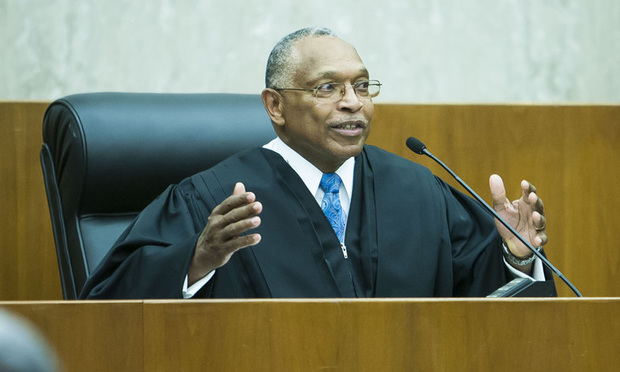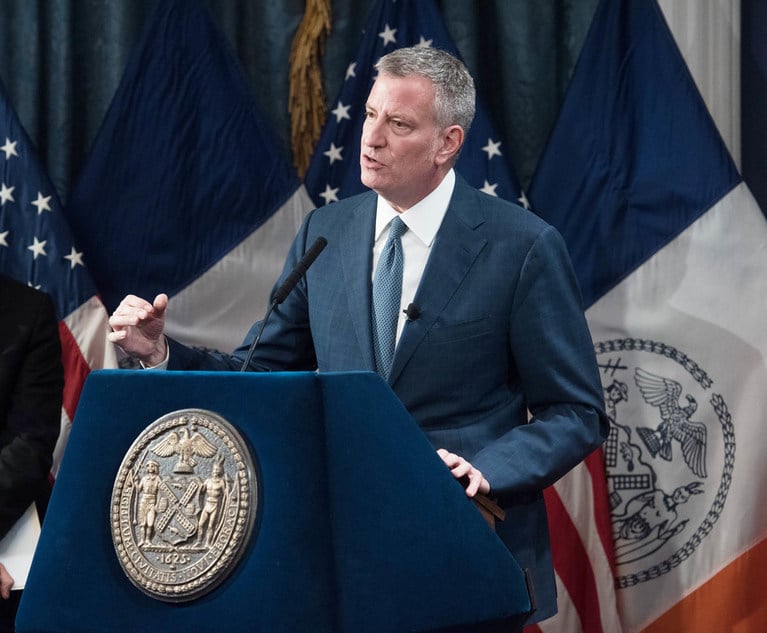Federal Judge Questions William Barr's 'Credibility' in Rollout of Mueller Report
"The actions of Attorney General Barr and his representations about the Mueller Report preclude the court's acceptance of the validity of the Department's redactions without its independent verification," U.S. District Judge Reggie Walton said Thursday in a public-records lawsuit.
March 05, 2020 at 05:32 PM
6 minute read
The original version of this story was published on National Law Journal
 Judge Reggie Walton of the U.S. District Court for the District of Columbia in 2016. Photo: Diego M. Radzinschi/ALM
Judge Reggie Walton of the U.S. District Court for the District of Columbia in 2016. Photo: Diego M. Radzinschi/ALM
A federal judge on Thursday assailed U.S. Attorney General William Barr's rollout of a report summarizing the special counsel investigation into Russian interference in the 2016 presidential election, saying the Justice Department leader's statements raised "grave concerns" about the process leading up to the document's public release last year.
U.S. District Judge Reggie Walton of the District of Columbia said he will conduct an independent review of former Special Counsel Robert Mueller III's report to determine whether the Justice Department had properly redacted, or blacked out, portions of the more than 400-page document ahead of its public release last year.
"The court has grave concerns about the objectivity of the process that preceded the public release of the redacted version of the Mueller Report and its impacts on the department's subsequent justifications that its redactions of the Mueller Report are authorized by the FOIA," Walton said in his 23-page ruling Thursday.
Walton said he could not "reconcile" Barr's statements with Mueller's conclusions, adding that the inconsistencies caused him to question whether the attorney general "made a calculated attempt to influence public discourse about the Mueller Report in favor of President Trump despite certain findings in the redacted version of the Mueller Report to the contrary."
A Justice Department spokesperson was not immediately reached for comment Thursday.
Citing the oath he took as a judge, "and the need for the American public to have faith in the judicial process," Walton said, "the actions of Attorney General Barr and his representations about the Mueller Report preclude the court's acceptance of the validity of the Department's redactions without its independent verification."
Walton added that the Freedom of Information Act's "objective of keeping the American public informed of what its government is up to demands nothing less."
"Accordingly, the court will conduct an independent review of the unredacted version of the Mueller Report to determine whether it concurs with the Department's determination that the redactions of the Mueller Report are authorized by the FOIA exemptions upon which the Department relies," he wrote.
 Attorney General William Barr. Photo: Diego M. Radzinschi / ALM
Attorney General William Barr. Photo: Diego M. Radzinschi / ALMThe Justice Department has publicly stated the Mueller report was redacted to protect, among other things, grand jury information; investigative techniques; protection of ongoing investigations; and information that would infringe on privacy rights.
In April 2019, Barr unveiled what he considered to be a synopsis of the Mueller report without immediately releasing the full report. Barr's presentation was widely criticized, even by Mueller himself. In a letter to Barr, Mueller said the attorney general's public characterization "did not fully capture the context, nature and substance of the special counsel's work and conclusions."
Barr's public statements about the report were criticized for creating the impression that Mueller's investigation had exonerated President Donald Trump when, in fact, it detailed possible evidence that the president obstructed justice.
In the report, Mueller's team said the investigation did not establish that members of the Trump campaign conspired or coordinated with the Russian government in its election interference activities." Although Mueller's team also found that the Russian government interfered to sway the election for Trump, whose campaign expected to benefit from the Kremlin's efforts.
Walton's ruling quotes and questions extensively from what Barr has said publicly about the Mueller report. Walton said Barr's "lack of candor" led him to "question Attorney General Barr's credibility" and the DOJ conclusion that information had been properly redacted in the Mueller report.
Walton said in Thursday's ruling that Barr "failed to provide a thorough representation of the findings set forth in the Mueller report." The judge said Barr's presentation of the report "causes the court to question whether Attorney General Barr's intent was to create a one-sided narrative about the Mueller report—a narrative that is clearly in some respects substantively at odds with the redacted version of the Mueller report."
Walton is presiding over a separate Freedom of information Act case that involves the firing of senior FBI official Andrew McCabe. Last month, the Justice Department said it was ending its criminal investigation focused on whether McCabe liked to investigators about a media link during his time at the FBI.
For months, Walton had questioned the government's drive to keep information secret in that case, as the criminal investigation was pending. Trump had repeatedly suggested McCabe should be prosecuted.
Walton recently ordered the disclosure of several court transcripts of conversations between him and prosecutors in the case. Those transcripts further revealed the judge's frustration about continued secrecy.
"The public is listening to what's going on, and I don't think people like the fact that you got somebody at the top basically trying to dictate whether somebody should be prosecuted," Walton said, according to the newly unsealed transcript. "I just think it's a banana republic when we go down that road and we have those type of statements being made that are conceivably even if not influencing the ultimate decision, I think there are a lot of people on the outside who perceive that there is undo inappropriate pressure being brought to bear."
The U.S. Court of Appeals for the D.C. Circuit is separately weighing whether to compel the disclosure of grand jury materials that underpin the Mueller investigation. The appeals court heard arguments in that dispute in December and has yet to issue a ruling.
Read more:
Justice Dept. Won't Pursue Case Against Andrew McCabe, Ending Uncertainty
Judge Reggie Walton Is Fired Up (Again) in McCabe-Related FOIA Suit
Judge Questions Whether DOJ 'Manipulated' Him in McCabe Public Records Suit
Mike Scarcella contributed reporting from Washington.
This content has been archived. It is available through our partners, LexisNexis® and Bloomberg Law.
To view this content, please continue to their sites.
Not a Lexis Subscriber?
Subscribe Now
Not a Bloomberg Law Subscriber?
Subscribe Now
NOT FOR REPRINT
© 2025 ALM Global, LLC, All Rights Reserved. Request academic re-use from www.copyright.com. All other uses, submit a request to [email protected]. For more information visit Asset & Logo Licensing.
You Might Like
View All
Nevada Supreme Court Rejects Uber-Backed Ballot Initiative for 20% Fee Cap
4 minute read
RFK Jr. Will Keep Affiliations With Morgan & Morgan, Other Law Firms If Confirmed to DHHS
3 minute read
As Unpredictability Rises, Gov't Law Practices Expect Trump Bump. Especially in Florida
5 minute read
Ex-NYC Mayor de Blasio Must Pay $475K Fine for NYPD’s Presidential Campaign Security
3 minute readTrending Stories
- 1Public Notices/Calendars
- 2Wednesday Newspaper
- 3Decision of the Day: Qui Tam Relators Do Not Plausibly Claim Firm Avoided Tax Obligations Through Visa Applications, Circuit Finds
- 4Judicial Ethics Opinion 24-116
- 5Big Law Firms Sheppard Mullin, Morgan Lewis and Baker Botts Add Partners in Houston
Who Got The Work
J. Brugh Lower of Gibbons has entered an appearance for industrial equipment supplier Devco Corporation in a pending trademark infringement lawsuit. The suit, accusing the defendant of selling knock-off Graco products, was filed Dec. 18 in New Jersey District Court by Rivkin Radler on behalf of Graco Inc. and Graco Minnesota. The case, assigned to U.S. District Judge Zahid N. Quraishi, is 3:24-cv-11294, Graco Inc. et al v. Devco Corporation.
Who Got The Work
Rebecca Maller-Stein and Kent A. Yalowitz of Arnold & Porter Kaye Scholer have entered their appearances for Hanaco Venture Capital and its executives, Lior Prosor and David Frankel, in a pending securities lawsuit. The action, filed on Dec. 24 in New York Southern District Court by Zell, Aron & Co. on behalf of Goldeneye Advisors, accuses the defendants of negligently and fraudulently managing the plaintiff's $1 million investment. The case, assigned to U.S. District Judge Vernon S. Broderick, is 1:24-cv-09918, Goldeneye Advisors, LLC v. Hanaco Venture Capital, Ltd. et al.
Who Got The Work
Attorneys from A&O Shearman has stepped in as defense counsel for Toronto-Dominion Bank and other defendants in a pending securities class action. The suit, filed Dec. 11 in New York Southern District Court by Bleichmar Fonti & Auld, accuses the defendants of concealing the bank's 'pervasive' deficiencies in regards to its compliance with the Bank Secrecy Act and the quality of its anti-money laundering controls. The case, assigned to U.S. District Judge Arun Subramanian, is 1:24-cv-09445, Gonzalez v. The Toronto-Dominion Bank et al.
Who Got The Work
Crown Castle International, a Pennsylvania company providing shared communications infrastructure, has turned to Luke D. Wolf of Gordon Rees Scully Mansukhani to fend off a pending breach-of-contract lawsuit. The court action, filed Nov. 25 in Michigan Eastern District Court by Hooper Hathaway PC on behalf of The Town Residences LLC, accuses Crown Castle of failing to transfer approximately $30,000 in utility payments from T-Mobile in breach of a roof-top lease and assignment agreement. The case, assigned to U.S. District Judge Susan K. Declercq, is 2:24-cv-13131, The Town Residences LLC v. T-Mobile US, Inc. et al.
Who Got The Work
Wilfred P. Coronato and Daniel M. Schwartz of McCarter & English have stepped in as defense counsel to Electrolux Home Products Inc. in a pending product liability lawsuit. The court action, filed Nov. 26 in New York Eastern District Court by Poulos Lopiccolo PC and Nagel Rice LLP on behalf of David Stern, alleges that the defendant's refrigerators’ drawers and shelving repeatedly break and fall apart within months after purchase. The case, assigned to U.S. District Judge Joan M. Azrack, is 2:24-cv-08204, Stern v. Electrolux Home Products, Inc.
Featured Firms
Law Offices of Gary Martin Hays & Associates, P.C.
(470) 294-1674
Law Offices of Mark E. Salomone
(857) 444-6468
Smith & Hassler
(713) 739-1250








